Undoing Human Supremacy
Undoing Human Supremacy
Anarchist Political Ecology in the Face of Anthroparchy
Edited by Simon Springer, Jennifer Mateer, Martin Locret-Collet, and Maleea Acker
ROWMAN & LITTLEFIELD
Lanham Boulder New York London
Published by Rowman & Littlefield
An imprint of The Rowman & Littlefield Publishing Group, Inc.
4501 Forbes Boulevard, Suite 200, Lanham, Maryland 20706
www.rowman.com
6 Tinworth Street, London SE11 5AL, United Kingdom
Copyright 2021 by The Rowman & Littlefield Publishing Group, Inc.
All rights reserved. No part of this book may be reproduced in any form or by any electronic or mechanical means, including information storage and retrieval systems, without written permission from the publisher, except by a reviewer who may quote passages in a review.
British Library Cataloguing in Publication Information Available
Library of Congress Cataloging-in-Publication Data
Names: Springer, Simon, editor. | Mateer, Jennifer, editor. | Locret-Collet, Martin, editor. | Acker, Maleea, 1975 editor.
Title: Undoing human supremacy : anarchist political ecology in the face of anthroparchy / edited by Simon Springer, Jennifer Mateer, Martin Locret-Collet, and Maleea Acker.
Description: Lanham, Maryland : Rowman and Littlefield, 2021. | Includes bibliographical references and index. | Summary: This volume encourages us to move towards a renewed understanding of humanity as firmly located within the biosphere Provided by publisher.
Identifiers: LCCN 2021020645 (print) | LCCN 2021020646 (ebook) | ISBN 9781538159125 (cloth) | ISBN 9781538159132 (ebook)
Subjects: LCSH: Human ecology. | Human-animal relationships. | NatureEffect of human beings on.
Classification: LCC GF41 .U64 2021 (print) | LCC GF41 (ebook) | DDC 304.2dc23
LC record available at https://lccn.loc.gov/2021020645
LC ebook record available at https://lccn.loc.gov/2021020646
 The paper used in this publication meets the minimum requirements of American National Standard for Information Sciences Permanence of Paper for Printed Library Materials, ANSI/NISO Z39.481992.
The paper used in this publication meets the minimum requirements of American National Standard for Information Sciences Permanence of Paper for Printed Library Materials, ANSI/NISO Z39.481992.
Contents
John P. Clark
Simon Springer, Jennifer Mateer, and Martin Locret-Collet
Friederike Schmitz
Patrik Gao
Ophlie Vron and Richard J. White
R.D.
Marcelo Lopes de Souza
Shane Mc Donnell
Randall Amster
Benjamin OHeran
Ali Bilgin and Kiraz zdoan
Simon Springer
Preface
An Anarchist Political Ecology
John P. Clark
What Is to Be Undone?
The title of this book is a very apt one. It tells us immediately that it is not merely about knowing, but above all about doing, and specifically about doing by undoing. It also tells us exactly what must be undone. It is human supremacy and anthroparchy, by which is meant both the ideology and the institutionalized practice of human domination. Furthermore, it challenges us to face the reality of this domination. There could be no more urgent entreaty than this one at the present decisive moment in the history of the Earth.
One indicator of the extent to which human domination of the biosphere has become an overwhelming reality is the fact that Human Appropriation of Net Primary Production doubled over the past century to 25%. This means that a huge proportion of the planets biomass is now being appropriated by humans. This proportion continues to grow and is projected to reach up to 44% by the middle of this century (Krausmann et al. 2013). While such statistics may seem disquieting, the process is perhaps more profoundly disturbing when one looks at the more concrete meaning of such appropriation. The mammalian world is now overwhelming dominated by humans. Human beings and their domesticated animals now constitute 96% of the biomass of all mammals on the planet, while mammals in the wild constitute a mere 4% of the total. Moreover, 70% of the biomass of all birds is that of farmed poultry alone, twice as much as that of all the other birds on Earth (Bar-On, Phillips, and Milo 2018).
The vast majority of the land has also succumbed to human domination. Humans have significantly transformed over three-fourths of the non-polar land area of the planet, thereby subverting the Earths regenerative processes, and leaving less than one-fourth in a condition of relative wildness (Watson et al. 2018). Finally, and most ominously, this ecologically devastating activity has culminated in the greatest, though most self-defeating, form of domination, the power of annihilation of life and life-forms. We have entered into the era of the Sixth Mass Extinction of life on Earth, in which extinction rates are perhaps 1,000 times the background rate and moving toward 10,000 times that rate (De Vos et al. 2015). At the same time, we are facing not only developing climate catastrophe but, according to sober scientific analysis, six other areas in which transgression of planetary boundaries threatens to produce disastrous state changes in the biosphere. (Rockstrm et al. 2009).
Much thought has recently been given to the concept of biopower. Perhaps it is time to give more thought to the concept of biodomination. The ecoanarchist sense of urgency that comes from an awareness of the depth of the crisis that results from this domination is expressed by the editors of this volume when they describe the pursuit of an anarchist political ecology as an attempt to reestablish balance in our world before the end of all human beings becomes a certainty (Introduction). In short, we now face the specter of an end to the history of human domination through a global ecological collapse that brings with it the fall of humanity itself. This is the ultimate significance of anthroparchy, or human domination. When Simon Springer argues near the end of this book that anarchism must focus its energies on undermining anthroparchy as much as it does on any other system of oppression (chapter 10), he is in no way overstating the importance of this world historical project.
Creating Anarchist Political Ecology
What then, is an anarchist political ecology? The three volumes of this work constitute a major step toward defining it, and demonstrate through their thirty wide-ranging chapters both its unity and its multiplicity. However, to begin with, we might look to the etymology of the term for guidance, since it reveals very well the fundamental nature of the field as a theory and practice. The term anarchist derives from the root arche and from the privative a, signifying negation. Arche in its political sense means ruling, and denotes constituting a separate power over those who are ruled. But, in a larger sense, it refers to all systemic forms of domination, which anarchists oppose and seek to abolish. There is a second relevant sense of arche that is even more primordial than the political one. Arche initially had the connotation of origin, and evolved into the ontological and epistemological concept of the first principle. Thus, in its underlying philosophical sense, anarche means opposition to the imposition of abstract principles on a changing, developing, living reality. This anti-essentialist, anti-dogmatic, anti-ideological perspective underlies the ethics and politics of anarchism, and indeed anarchist epistemology, its way of knowing the world.
So much for anarchist. We come next to political ecology. The term political derives from the Greek polis, which refers to the political community. Anarchism espouses the political in the very strong sense in which

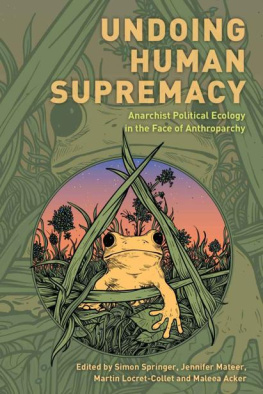


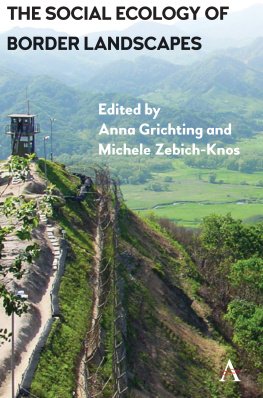
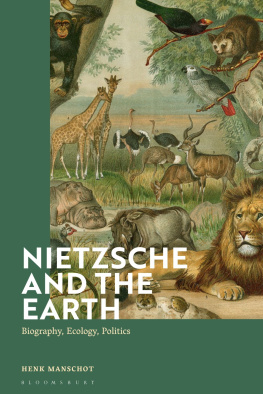

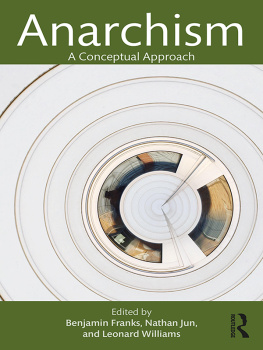
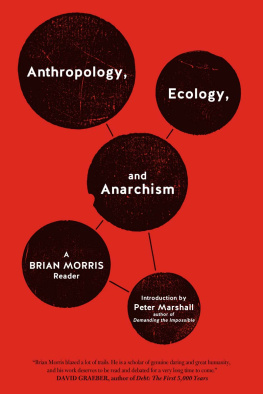
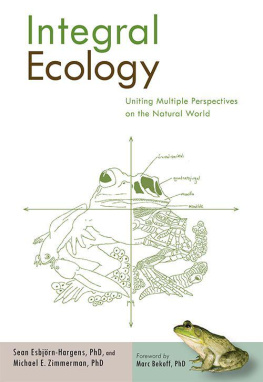
 The paper used in this publication meets the minimum requirements of American National Standard for Information Sciences Permanence of Paper for Printed Library Materials, ANSI/NISO Z39.481992.
The paper used in this publication meets the minimum requirements of American National Standard for Information Sciences Permanence of Paper for Printed Library Materials, ANSI/NISO Z39.481992.